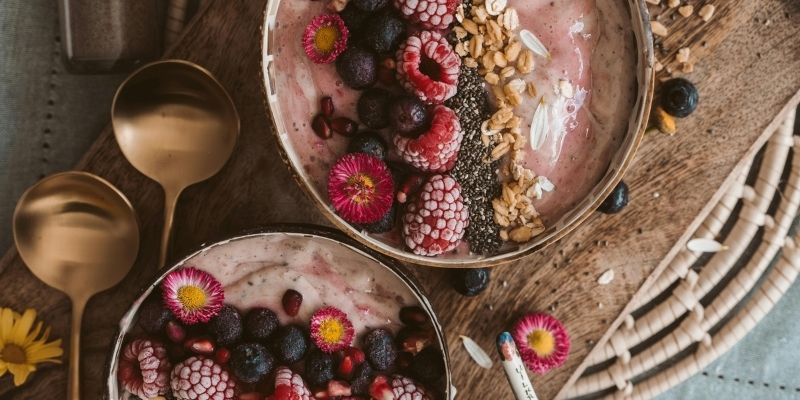Cardiologists understand more than anyone how crucial it is to maintain a healthy heart. Their demanding job gives them insight into what foods work best to keep heart disease at bay. Diet is vital for heart disease prevention because it is the top cause of mortality in the United States for both men and women.
This article explores the daily meals of four prominent cardiologists and how their diets contribute to keeping their hearts strong. Let's examine their routines. In this way, you can learn from their choices and improve your heart health.

A Healthy Start: Breakfast Choices of Cardiologists
Cardiologists know that breakfast is key to starting the day on the right foot. Here's how they fuel up:
Dr. Evelina Grayver, a well-known cardiologist, begins her day with non-fat Greek yogurt topped with berries and chia seeds. She pairs this with a warm cup of water and lemon to stay hydrated. This helps her refresh her system.
Why this works:
Greek yogurt is packed with protein, which keeps you full and stabilizes blood sugar. Berries like blueberries and strawberries contain high levels of antioxidants and anthocyanins that reduce inflammation and prevent the buildup of plaque in the arteries. Chia seeds add fiber and omega-3s, further helping with heart health.
Favorite snacks:
Dr. Grayver prefers walnuts and dark chocolate for mid-morning snacks. Walnuts contain alpha-linolenic acid (ALA). This is a plant-based omega-3 that can reduce cholesterol and prevent plaque formation.
Dark chocolate (80% cacao or higher) is rich in antioxidants and can help lower blood pressure in moderation.
Heart-Healthy Lunches Packed with Nutrients
When lunchtime rolls around, cardiologists focus on balanced meals filled with protein, healthy fats, and fiber:
Dr. Rachel Bond opts for a kale salad with skinless chicken breast, avocado, tomatoes, and cucumbers.
Why this works:
Kale is rich in omega-3 fatty acids, fiber, and antioxidants. Avocados provide heart-healthy fats that lower bad cholesterol and improve artery function. The lean protein from chicken supports muscle health without adding excess fat, and cucumbers and tomatoes bring hydration and vitamins.
Snack tip:
Dr. Bond's favorite snacks include hummus with carrots, celery, or cherry tomatoes.
- Hummus is a great source of fiber and low in saturated fat, keeping you full and preventing unhealthy cravings. Pairing it with fresh veggies adds a dose of vitamins and antioxidants.
Dinner Decisions: Lean Proteins and Fiber-Rich Vegetables
For dinner, cardiologists tend to choose meals that balance lean protein and vegetables rich in fiber:
Dr. Rohan Bhansali enjoys a salmon meal with roasted asparagus.
Why this works:
Salmon is one of the best sources of omega-3 fatty acids, which can reduce inflammation and lower the risk of heart disease. In order to improve digestion and lessen blood sugar spikes, asparagus adds fiber.
Dr. Satjit Bhusri occasionally includes red meat in his diet, but only in moderate quantity. He recommends a small portion of filet mignon paired with steamed Brussels sprouts and squash.
Why this works:
Red meat provides iron and essential amino acids, but it should be eaten sparingly to avoid consuming too much-saturated fat. Brussels sprouts and squash are full of fiber and vitamins, helping to reduce cholesterol and support heart health.

Cardiologists' Favorite Snacks for a Healthy Heart
Snacking is an important part of keeping your energy up between meals, and cardiologists know the value of making healthy choices:
- Unsalted nuts like almonds and walnuts are popular among cardiologists for their heart-healthy benefits. They are packed with omega-3 fatty acids, protein, and fiber, helping reduce cholesterol and inflammation.
- Fresh fruits like blueberries, raspberries, and apples are another go-to snack. They are rich in antioxidants, particularly berries, which have been shown to lower blood pressure and prevent plaque buildup in arteries.
- Dark chocolate (in moderation) also makes an appearance in cardiologists' snack choices. High-quality dark chocolate is rich in flavonoids, which can improve blood flow and reduce heart disease risk.
Foods Cardiologists Avoid for Better Heart Health
While there's no "one-size-fits-all" rule for what to avoid, cardiologists have their personal preferences when it comes to keeping their diets heart-healthy:
Fried foods:
These are universally frowned upon. Cardiologists avoid anything fried due to the high levels of trans fats and saturated fats that can raise cholesterol levels and contribute to heart disease.
Sugary snacks:
Foods high in added sugar are another big no-no. Added sugar can lead to weight gain, diabetes, and increased cholesterol levels, all of which strain the heart.
Processed snacks:
Highly processed snacks like chips and packaged baked goods are avoided because they are typically high in salt, sugar, and unhealthy fats. Cardiologists prefer to stick to whole, natural foods.
Quick Takeaways for a Heart-Healthy Diet:
Incorporate protein early:
A protein-rich breakfast like Greek yogurt can help stabilize blood sugar and reduce cravings.
Snack smart:
Opt for heart-healthy snacks like nuts, fruits, and dark chocolate (in moderation).
Choose omega-3-rich foods:
Include salmon, walnuts, and chia seeds in your meals to benefit from their anti-inflammatory properties.
Focus on fiber:
Load up on fiber-rich vegetables like kale, asparagus, and Brussels sprouts to improve digestion and lower cholesterol.
Stay hydrated:
Start your day with water and keep drinking throughout to support circulation and overall health.
By making small changes and choosing nutrient-dense foods, you can follow in the footsteps of cardiologists and give your heart the support it needs.
This heart-healthy diet is all about balance and moderation. By eating more omega-3 fatty acids, antioxidants, and fiber while avoiding fried and sugary foods, you can help protect your heart and overall health.
The Danger of Using Unhealthy Food
Frequent consumption of unhealthy foods, such as those heavy in added sugars, saturated fats, and salt, can cause major health issues. These foods raise the risk of heart disease and stroke by causing weight gain, high blood pressure, and high cholesterol.






